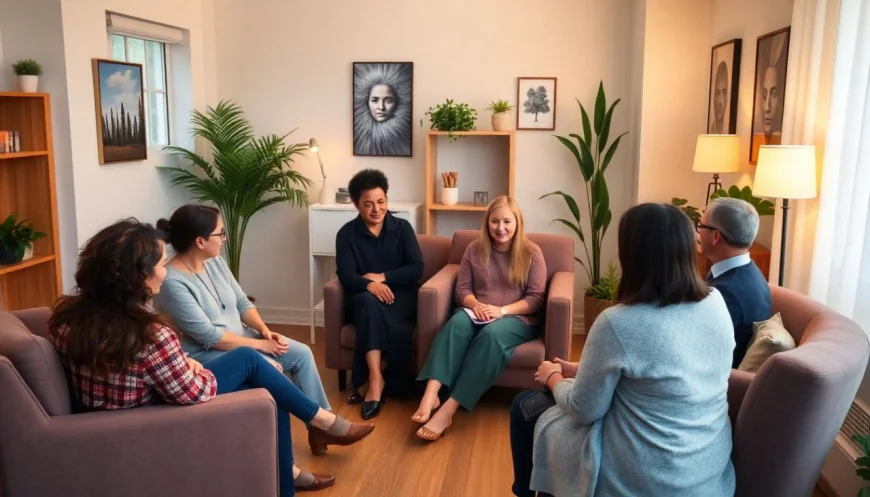Who to Talk to for Mental Health Issues: A Complete Guide to Support Networks and Resources
Mental health struggles can hit anyone at any time. Recognizing the need to seek help is the first step toward feeling better. Reducing the stigma around mental health makes it easier for people to ask for support. Knowing who to reach out to is just as important as recognizing when you need help. There are many options—medical professionals, community groups, online resources—that can guide you through tough times.

Recognizing the Need for Support: When to Seek Help
Signs and Symptoms Indicating You Need Assistance
Everyone experiences stress, but persistent feelings of sadness, anxiety, or confusion might mean you need support. Watch out for signs like trouble sleeping, loss of interest, or feeling hopeless. Changes in your energy, eating habits, or suddenly withdrawing from friends can also signal a problem. If mental struggles are impacting your daily life, reaching out is smart.
The Importance of Early Intervention
Getting help early can stop small issues from becoming bigger. When you act quickly, you're more likely to recover faster. For example, someone who talks to a counselor at the first sign of anxiety can learn skills to manage it, instead of dealing with worsening fear or worry months later. The sooner you seek help, the better your chances of feeling like yourself again.
Mental Health Professionals: Who They Are and How They Can Help
Psychiatrists
Psychiatrists are medical doctors who focus on mental health. They can diagnose conditions, prescribe medication, and suggest treatment plans. If symptoms interfere with your daily tasks or if you’ve tried therapy without success, a psychiatrist might be the best choice. They’re especially helpful for severe depression, bipolar disorder, and schizophrenia.
Psychologists and Therapists
These professionals offer therapy sessions to help you understand your feelings. They use techniques like Cognitive Behavioral Therapy (CBT) or talk therapy. Regular sessions can teach you ways to handle stress, anger, and sadness. They don’t prescribe medication but are very effective in providing emotional support.
Counselors and Social Workers
Counselors focus on guiding you through life's challenges. They provide support for everyday struggles, such as grief or relationship issues. You often find them in schools, community centers, or clinics. Social workers can connect you with social programs and help navigate life's hurdles.
Other Specialized Professionals
Sometimes, you need a specialist. Occupational therapists help with daily functioning. Addiction specialists support recovery from substance abuse. Holistic practitioners might provide alternative therapies like acupuncture or meditation. Choose a specialist if your situation requires unique care.
Primary Care Physicians: Your First Point of Contact
Role of General Practitioners in Mental Health
Your regular doctor is often the first person you see for health issues. They can do screenings and ask about your mental state. If they suspect a problem, they can refer you to a mental health expert. Many clinics now include mental health checkups along with physical exams.
Benefits of Integrating Physical and Mental Health Care
Your physical and mental health are connected. Addressing both at once saves you time and effort. If you have conditions like diabetes or chronic pain, managing mental health helps improve overall wellness. It also makes it easier to get the right treatment without delays.
Community and Support Networks
Support Groups and Peer Support
Sharing your story with others who understand can be a game changer. Support groups offer a safe space to talk about feelings and worries. They remind you you're not alone. Look for local groups or online communities, such as NAMI (National Alliance on Mental Illness).
Hotlines and Crisis Resources
Sometimes, you need help now. Crisis helplines like the National Suicide Prevention Lifeline or the Crisis Text Line offer immediate support. They’re free and available 24/7. Keep their numbers handy and don’t hesitate to call if you're feeling overwhelmed.
Educational and Advocacy Organizations
Groups like Mental Health America work to raise awareness and fight stigma. They share helpful information and advocate for better access to care. Getting involved or just learning more can empower you and others struggling silently.
Digital Resources and Online Therapy Platforms
Telehealth Services
Online therapy has made mental health care easier than ever. Virtual sessions work around busy schedules and are private. Platforms like BetterHelp and Talkspace connect you with licensed therapists from home. It’s a safe way to get support without leaving your room.
Mental Health Apps and Self-Help Tools
Apps can be a quick fix for managing moods, practicing meditation, or understanding mental health better. Choose apps with good reviews and proven effectiveness. Apps can serve as daily reminders to stay mindful or track your thoughts, helping you recognize patterns early.
Conclusion
Knowing who to talk to makes a huge difference when facing mental health issues. Whether it’s a professional, a community group, or online platform, help is available. The key is to reach out early before problems grow bigger. Don’t wait in silence—your mental wellness depends on it. Take that first step today and start building your support network. Your mental health matters, and help is just a call or click away.



 VARSHITHA
VARSHITHA